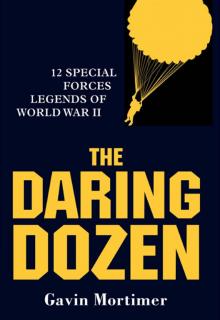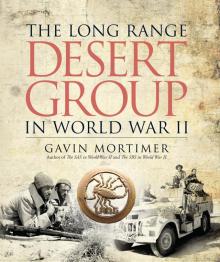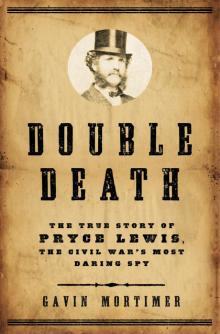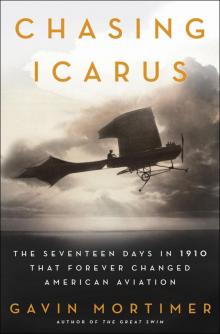- Home
- Gavin Mortimer
Double Death Page 26
Double Death Read online
Page 26
Alexander also moved the two men from their cell on the third floor to the more spacious Citizens’ Room below. Lewis found the transference wryly amusing, proof of “what a difference money makes, even in the case of condemned prisoners.” The Citizens’ Room contained “a different class of prisoner: men connected with the sanitary commission, correspondents of newspapers, merchants captured on the coasts [but] with enough of the poor to act as substitutes for scavenger duty.” Here the windows were glazed, half barrels were used as chairs and there was even a stove in one corner. Among the denizens of the Citizens’ Room was J. T. Kerby, an Englishman living in Niagara, Canada, who had been arrested in November 1862 on the charge of spying. Kerby claimed he had come to Virginia on a business trip, but in reality he was a Union spy, though not in Pinkerton’s employ. The two most prominent newspaper reporters held in the Citizens’ Room were twenty-nine-year-old Albert Richardson and thirty-seven-year-old Junius Browne of the New York Herald Tribune. They had been captured at Vicksburg in May 1863, along with Richard Colburn of the New York World. Colburn was soon released (the Confederates didn’t much mind his newspaper), but the Tribune was considered one of the most bilious organs of the North. Richardson and Browne were thrown in Castle Thunder as punishment for the poison that flowed from their pens.
Richardson and Lewis soon got to talking and discovered they had common ground. The reporter had been with Cox’s army two years earlier during the Kanawha Valley campaign. Richardson rated Cox “an excellent officer,” and they shared fond memories of the camp at Poca and the river trip to Charleston.
Privately, Richardson was appalled by the appearance of the two spies, disclosing in his diary that “they held existence by a frail tenure … long anxiety had turned Lewis’s hair gray, and given to both nervous, haggard faces.” The arrival of Browne and Richardson aided Lewis’s rehabilitation for they shared Lewis’s eye for the absurd, and nothing was more absurd in Castle Thunder than Captain Alexander. Richardson giggled behind his hands at the sight of Alexander strutting around the prison in “pompous attire that included gauntlets and a red sash,” but it was his verse that had the men weeping tears of laughter.
At nighttime the Citizens’ Room was lit with gas, so the men kept late hours playing checkers or whist, reading, talking and smoking. They composed lighthearted verses, obviously nowhere near the quality of Alexander’s offerings. Their favorite was “The Castle Song.”
At the head of the Richmond Post they have placed a Marylander
And like a Devil in Regions lost there sits old Gen. Winder
He snaps & snarls & rips & swears when he’s sober & when he’s tight
The old villain’s heart’s as black as his head is white
All through this vicinity they hate him as hard they can
But never do as they slander him by calling him a decent man
Yet as mean as he’s a patriot that may be understood
For when he left the Yankee Country twas for that country’s good
In the door of the Castle like a stopper in a jug
To shut the mouth of the prison they’ve stuck a bell plug
It is Capt Alexander, who’s so cross & spunky
He’s not fit for a commander of an oyster pungy
The capt. is such a case as may often be seen
Who thinks he’s smart but is very green
He’s a thundering blower but would dare not fight
As dogs that bark the loudest are seldom known to bite
One September day Lewis read in a Richmond paper that Brigadier General Humphrey Marshall had arrived in the city. Marshall was a large man, “too heavy to mount a horse,” but he was a doughty commander and a brave soldier. In May 1862 his forces had defeated those of General Jacob Cox at Princeton, Virginia. The report Lewis read related that the fifty-one year-old Marshall had now resigned from the army and was in Richmond to serve the Confederacy in a civil capacity. There was also a throwaway line that among the general’s friends was Robert Ould, the Southern agent for exchange of prisoners. Lewis “suggested to Scully that as he was intimate with Captain Alexander to speak to him about Marshall and see if he could not be retained to do something for us.” Scully thought it worth a try. So did Alexander, who liked to boast he had the ear of everyone in Richmond.
For a few days nothing happened; then one morning a guard came to fetch Scully from the Citizens’ Room. When the Irishman returned he told Lewis that he’d spoken to Marshall, who promised to investigate their plight. Marshall reappeared a couple of days later and informed Scully that “he had seen Commissioner Ould about our case and he thought an exchange could be accomplished.”
Scully had two or three further interviews with Marshall, and at each one the general’s jowls wobbled as he nodded his head and told the prisoner that he saw no reason why their release couldn’t be effected. The tension was excruciating. Lewis and Scully refused to allow themselves to believe they might soon be free. They played cards, read, slept; they did everything but speculate on their liberty.
On the morning of Saturday, September 26, 1863, the pair were summoned from their cell and led downstairs into Captain Alexander’s office. Humphrey Marshall told Lewis and Scully that he had obtained their release.
Before either Lewis or Scully had time to mumble a thank-you, Marshall added that their freedom came with a price: five hundred dollars each. Lewis’s heart sank. He detected the malevolent hand of General Winder; it was another of his cruel psychological torments. Lewis asked how they could possibly find such a sum, explaining that the only money they had was what remained of the cache sent by the Pinkerton agency.
Marshall casually replied that if the pair gave him a joint note for one thousand dollars he would trust them to honor it once they had their freedom. It was a deal. Marshall wrote a receipt, Lewis and Scully signed it, and they “began at last to take breath, it looked as if we were really going to get away.”
The next forty-eight hours took an age to pass. They told each other that they wouldn’t believe they were going home until the moment they saw their first Stars and Stripes fluttering in the breeze. What they expected to see at any moment was the leering face of Winder or one of his Plug-Uglies laughing at their evil prank.
Then on the afternoon of Monday, September 28, Caphart entered the Citizens’ Room and ordered the two spies to collect their belongings. They asked why. Caphart told them to shut up and do as they were told. Lewis had hardly any belongings to gather. He put on his tatty felt hat, slung his coat over his arm and at the last moment remembered Captain Alexander’s ballad, the “Virginia Cavalier.” He must take that to show the boys.
Lewis and Scully then “said goodbye to our fellow prisoners, including the newspaper correspondents, for whom we carried messages to their friends,” and followed Caphart downstairs. They were taken to Libby Prison, just a couple of hundred yards along Cary Street from Castle Thunder, and ordered to stand in line with some other prisoners and sign their parole. When it was the turn of Lewis and Scully, the officer behind the desk read the names on the form and looked up at the two shriveled men before him. If it had been up to him, he told them, they would have hung with Webster.
They remained in Libby Prison overnight, and just before dawn on Tuesday, September 29, they and the other paroled prisoners were marched west along Cary Street, which ran parallel to the James River, to the Richmond and Petersburg Railroad Depot, at the corner of Byrd and Eighth streets. It was no more than a mile, but it exhausted Lewis and Scully. With what strength Lewis had left he “got up on a box freight car for fresh air. It tasted delicious.”
At ten minutes to six the train began to move. It was true, they really were going home. They arrived in Petersburg at seven thirty a.m., changed trains and continued their journey to City Point on the James River. The flag-of-truce boat was waiting for them, and there hanging limply from the mast in the cool morning air was the Union flag. Lewis turned to Scully and said, “If before this I
had any English feelings left, I’ve been turned into a complete American now.”
Scully and Lewis arrived at College Green Barracks, Annapolis, in Maryland on the morning of Wednesday, September 30. There they encountered Major S. E. Chamberlain, First Massachusetts Cavalry, in charge of the parole camp. He was a “full-dressed, pompous, heavy official” who declined Lewis’s request for help in reaching Washington, citing a recent order issued by the War Department denying transportation to civilians. But we’re not civilians, retorted a furious Lewis, who in response to Chamberlain’s continued indifference “told him something of the service [we] had rendered the government … that we had been prisoners for nineteen months, under sentence of death part of the time, and chained hand and foot.” The outburst failed to move the officer, so Lewis turned to Scully and suggested they walk the forty miles to Washington. But Scully had a better idea. Why not pawn Lewis’s coat and with the money buy two train tickets to Washington? That required a pass, however, which Chamberlain at first refused. Eventually he relented and on a scrap of paper wrote out a permit: “The bearer Lewis Price [sic], a citizen of England, arrived this morning from Richmond by flag of truce boat. The guards and patrols will allow him to pass. S. E. Chamberlain, Maj 1st Mass. Cav., comd’g A,G,B.”
Lewis and Scully walked into town and pawned the coat for three dollars. They found a saloon, “lunched on bread and cheese,” and caught the evening train west to Washington, arriving at nine o’clock at the Baltimore & Ohio station. It felt strange to be in the capital again. So what do we do now? they wondered. Pinkerton had moved his headquarters back to Chicago, they knew that from his letters, but who else remained in the city who could help them? They remembered Colonel William Wood, superintendent of the Old Capitol Prison, to whom they had delivered the odd Confederate sympathizer. He would be of assistance. They trudged to Old Capitol Prison, a three-story brick building on the corner of Pennsylvania Avenue and East First Street (site of today’s U.S. Supreme Court). There they told their story to a guard, who fetched Wood, but when the superintendent arrived at the prison gate he looked upon the two men with suspicion. Don’t you know me, Colonel? asked Lewis. Wood squinted at the gray-haired, middle-aged man. He shook his head. It’s me, said the Englishman. Pryce Lewis.
For a few moments Wood was speechless; then “he uttered an exclamation of astonishment and indulged in considerable profanity to express his feelings of surprise.” He ushered the men inside to his office, fed them and listened to their tale of woe. Wood then summoned the captain of the guard and told him to have two cots made up. In the morning Dr. Ford, the prison doctor, inspected the men, and Wood telegrammed Pinkerton, who was in Philadelphia.
Pinkerton replied on the same day, October 1: MANY THANKS FOR YOUR KIND INFORMATION. TELL SCULLY AND LEWIS TO COME HERE. I CANNOT POSSIBLY LEAVE JUST NOW. SHOULD THEY REQUIRE MONEY TO COME PLEASE LET THEM HAVE IT AND I WILL RETURN IT TO YOU. GIVE THEM MY ADDRESS HERE AND TELL THEM TO AVOID ALL PUBLICITY OF THEIR AFFAIRS UNTIL THEY SEE ME.
C H A P T E R T W E N T Y - F I V E
“Lewis Remained Staunch, and Did Not Confess”
PINKERTON HAD RESIGNED as chief of the secret service of the Army of the Potomac on November 7, 1862, the day McClellan had been relieved of his command. In his memoirs Pinkerton said he quit because he was McClellan’s man and considered his treatment unjust. The thought of working for his successor, General Ambrose Burnside, wasn’t an option, though there was no evidence that the new commander urged Pinkerton to remain.
For months Pinkerton had railed against the “Washington Cabal,” men such as Edwin Stanton and Henry Halleck, the army’s general in chief, sending regular reports from Washington to McClellan’s headquarters on all the intrigue. It was the opinion of Pinkerton, as well as McClellan, that Washington was deliberately withholding supplies and munitions and thus making it impossible for McClellan to pursue the Confederates across the Potomac. Munitions might have been slow in arriving from the east, but then as Lincoln—furious that his general hadn’t gone after the rebels—had written McClellan in late October, “Will you pardon me for asking what the horses of your army have done since the battle of Antietam [on September 17] that fatigues anything?”
But there were other factors at work that probably contributed to Pinkerton’s decision to resign. Since his installation in Washington reporting to McClellan, Pinkerton had encountered a reluctance on the part of the government to settle the agency’s accounts. On several occasions, the Scot had been forced to telegraph George Bangs in Chicago requesting drafts so he could pay his detectives, who received ten dollars a day, as well as settle other expenses incurred in the line of duty. In October 1862 matters came to a head when Peter Watson, the assistant secretary of war, questioned Pinkerton’s bill for the months from July to September. He also insisted Pinkerton reveal the full names of his operatives in his accounts, not just their initials. Pinkerton, understandably, refused. It was sensitive information, and also invaluable to the South, which still had informers within government departments. Pinkerton told Watson that one of his men had already been hanged; he didn’t wish another to go to the scaffold.
Pinkerton was also influenced by what had passed in Richmond. Webster and Lewis had been his most trusted and effective detectives. Their absence immeasurably reduced the potency of his agency. Those who remained were competent at counterintelligence, but when it came to gathering positive intelligence (“actionable intelligence,” as it is now known), none possessed the guile, wit and charisma of Webster or Lewis. And how much had the execution of Webster frightened Pinkerton’s operatives? In the first year of the war neither side had hanged spies, and there was an unwritten understanding that that would remain the case throughout the war. A spy preparing to penetrate the enemy’s line might expect a bit of roughing up if caught, and a few months in a dirty prison, but not death. Webster’s fate had changed all that. Even before the tragedy one of Pinkerton’s operatives, Charles Rosch, had refused to accompany Lewis to Richmond because he considered it too dangerous. And now, why would anyone volunteer to head south if there was a strong possibility they would end up in the hangman’s noose? It might have been that Pinkerton ran out of spies willing to risk their lives, and McClellan’s departure allowed him to remove his agency from the field without losing face.
That’s not to impugn the courage of Pinkerton’s operatives; the fact was that by the autumn of 1862 the nature of the war had changed considerably during a year and a half of fighting. The first few months of the war had been chaotic, with neither side able to cope with the vast number of recruits that flocked to the cause. Local militia units added to the confusion, as did the initial short term of enlistments that saw men come and go with bewildering frequency. Penetrating an army in the field is the hardest task for a military spy, but in the commotion of 1861 it was easier for a spy to go about his work unobtrusively.
There was also an innocence, a naïveté, to many combatants whose romantic notions of warfare had yet to be blasted to shreds by reality. Would Colonel Patton, for example, have trusted Pryce Lewis so implicitly a year later? Would he have wined and dined him, offered to show him around the camp? More likely the cynicism of the hardened soldier would have led Patton to suspect something wasn’t quite right about the quirky Englishman.
Furthermore, throughout 1862 the static warfare of the previous year had been replaced by more fluid conflict, in which the Confederates proved more adept. In May General Stonewall Jackson had ripped through the Shenandoah Valley, defeating General Frémont’s forces in several encounters, and then it was the turn of Robert E. Lee’s Army of Northern Virginia to push north after July’s Seven Days Battles. Victories for Lee at the Second Battle of Bull Run (August 28–30) and Chantilly (September 1) heralded the rebel drive into Maryland and further bloody encounters at Harpers Ferry, South Mountain and Antietam. Thus the Confederate forces were continually on the move, far more transient than they had been for much of 1861 when they and
the Union army, once they had organized the recruits into a semblance of regiments, dug in and waited to see who would make the first move.
In short, the glamorous heyday of the Civil War spy had come and gone by the end of 1862. There would be no more Websters or Lewises, spies who were masters of gathering positive intelligence from the heart of the enemy, certainly none who were as successful. Espionage in the rest of the war took on a more prosaic nature, if one draws a distinction between the civilian spy and the soldier spy, men such as the Confederate captain John Beall and Major Harry Young of the Union army. They were trained soldiers who led small bands of men through enemy territory, wearing their foe’s uniform, not just gathering intelligence but also waging guerrilla war and bringing back prisoners.
For the civilian spy, espionage in the second half of the war focused more on counterintelligence, with the positive intelligence being undertaken not by infiltrators but by people long established within their community. The most skilled of these was Elizabeth Van Lew, who hailed from one of Richmond’s most respected families and lived in a grandiose mansion on Church Hill. Van Lew, a cultured woman in her late forties, was a proud Virginian but a vehement abolitionist and staunch Unionist. Her views were common knowledge, and while they incurred the opprobrium of her neighbors, no one thought she was anything other than an old maid with a kind heart, who made frequent trips to Richmond’s prisons, doling out parcels of food and clothing to the inmates.
As the war lengthened, Van Lew began smuggling coded messages to the North through a network of informants, mostly pro-Union Virginians like her, farm laborers, storekeepers and factory workers. The messages contained details of rebel troop strength and fortifications, some of which came from her contacts within the Confederate administration and some from the mouths of captured Northern soldiers held in Richmond’s jails. Though Winder began to suspect Van Lew’s sympathies extended to more than just mercy missions to prison, he could never catch her in the act despite having her put under surveillance. Van Lew was the antithesis of Rose Greenhow, not just in looks but in personality. She was discreet and cautious, and as courteous to the enemy as Greenhow was disdainful. As she once said of General Winder, “I can flatter almost anything out of old Winder, his personal vanity is so great.”

 The Daring Dozen
The Daring Dozen The Long Range Desert Group in World War II
The Long Range Desert Group in World War II Double Death
Double Death Chasing Icarus
Chasing Icarus